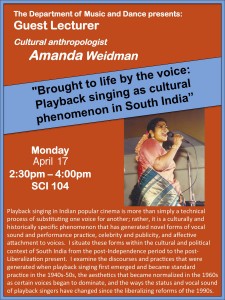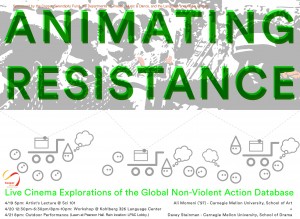Animating Resistance: Live Cinema Explorations of the Global Nonviolent Action Database
Prof. Ali Momeni, Carnegie Mellon University
- 19 April: 5:00 p.m. Artist’s Lecture in Science Center Room 101
- 20 April: 12:30-6:30 pm and 8:00-10:00 pm Workshop in Kohlberg 326 Language Center
- 21 April: 8:00 pm Outdoor Performance (Pearson Hall Lawn. Rain Location: LPAC Lobby)
More details.

The theme for this workshop and performance will be Swarthmore College’s Peace and Conflict Studies’ inimitable and inspiring Global Nonviolent Action Database. Momeni and the workshop participants will collaborative create and perform a live cinema/projection performance that consists of animations depicting and annotating the contents of this database in playful and performative ways. Momeni will be assisted by artist and MFA Candidate Davey Steinman for this performance.
Ali Momeni’s performance project at Swarthmore College will combine cinema, outdoor projection, improvisation, animation, “depicting the characters, setting and methods of specific actions from the Global Nonviolent Action Database like an animated graphic novel.”
Momeni was born in Isfahan, Iran and emigrated to the United States at the age of twelve. He studied physics and music at Swarthmore College and completed his doctoral degree in music composition, improvisation and performance with computers from the Center for New Music and Audio Technologies at UC Berkeley. He spent three years in Paris where he collaborated with performers and researchers from La Kitchen, IRCAM, Sony CSL and CIRM.

Photo credit: iMAL.org under Creative Commons license 2.0 https://creativecommons.org/licenses/by-nc-sa/2.0/ http://bit.ly/2oRJgje
Between 2007 and 2011, Momeni was an assistant professor in the Department of Art at the University of Minnesota in Minneapolis, where he directed the Spark Festival of Electronic Music and Art, and founded the urban projection collective called the MAW. Momeni is currently an associate professor in the School of Art at Carnegie Mellon University and directs CMU ArtFab, teaches in CMU’s IDEATE, Music Technology and Masters in Tangible Interaction Design degrees.
Momeni’s current research interests include performative applications of robotics, playful urban interventions, interactive projection performance, machine learning for artists and designers, interactive tools for storytelling and experiential learning, mobile and hybrid musical instruments, and the intersection of sound, music and health.
Davey T Steinman is an artist and explorer working at the crossroads of performance and technology. Davey is currently pursuing an M.F.A. in Video and Media Design in the School of Drama at Carnegie Mellon University.
This event is free and open to the public.
Sponsors: The Cooper Serendipity Fund, Kohlberg Language Center, Dept. of Theater, and Dept. of Music and Dance








